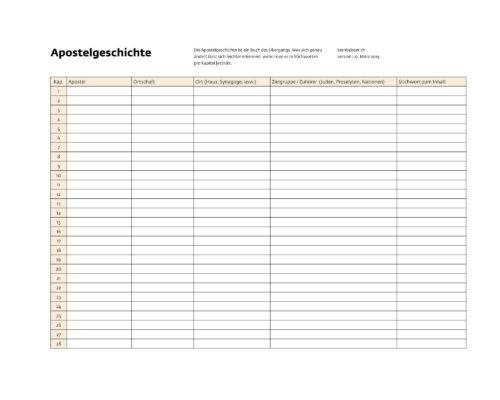The Acts of the Apostles is often considered merely a “narrative”, something like a first century road movie. The book, however, fulfills a key role in the New Testament. It describes the disputes among the apostles and the development of the first churches. On the one hand this is the church in Jerusalem, with the 12 apostles, but on the other hand it is something completely new, namely a church from all nations, through the calling and work of a new apostle, Paul.
Nothing seems like it was
The reality of the first weeks after Jesus’ ascension was characterized by extreme experiences: Jesus’ death, resurrection and ascension. The unbelievable had happened. The apostles now saw themselves as “witnesses of the resurrection” (Acts 1:22) and no longer merely as “preachers of the gospel of the kingdom” (Matt. 10:1-7). The book of Acts describes how it continued. There was a “before the cross” and there is a “after the resurrection”. Acts is in the right place, between the Gospels and the Epistles.
Suddenly Jesus was no longer there and both the apostles and the church had to deal with a new situation. This did not happen entirely smoothly. In particular, the appearance of a new, 13th apostle, Paul of Tarsus, was the occasion for major changes. He received a special calling and set out for new horizons. Paul learned that the nations were receptive to a message of grace.
For the 12 apostles, it was unthinkable that gentiles would have access to this messianic expectation from Israel. Peter had to be laboriously persuaded by visions to make contact with a gentile. However, this Cornelius was not simply a gentile, but he was a proselyte, someone who was very close to Judaism. For Peter this was already a problem, to which he had to make special experiences, so that he got involved with this Cornelius. He was so progressive in doing so that he faced taut headwinds from the other Jews in the Jerusalem community.
The calling of Paul
Paul was called by God so that something new could happen. He speaks several times about “his” gospel and tells of “secrets” that he was now to reveal. We should not underestimate this, because he was talking about different things than the 12 apostles. Paul also addresses different things than Jesus does in the Gospels (see this post). He was taught directly by Jesus Christ and his preaching does not simply speak of the same things as the 12 had internalized.
The 12 apostles received a “Great Commission” from Jesus, but they never carried it out. Paul, however, goes out to the nations, but he does not do a mission in the sense that Jesus had told the 12. Paul does not proselytize nations or teach them to keep commandments as the 12 were commissioned to do (Matt 28:19-20). This first period was therefore very exciting. Something new was happening here!
This differentiation is little known. Many Christians think that the whole New Testament speaks of Jesus, and therefore everything speaks of the church today. However, this is a short circuit. If you read along carefully with the story, you will discover that Jesus and the 12 apostles were exclusively concerned with the expectation of Israel. In these ideas, there was no church as we know it today. This does not change until Paul is called. Only he is called “apostle of the nations”. Paul alone speaks of the church as the “body of Christ.” The 12, however, do not change course. They are still in the expectation of the promises for Israel. Only Paul speaks of having direct spiritual access to God without the mediation of the people of Israel (Eph 2:18). That was mind-blowingly new. Now a second church was formed, the present church, the body of Christ. It arose in parallel with the Jerusalem congregation. This can be traced in the book of Acts.
What is the development in the New Testament?
After the ascension of Jesus, a development began that was characterized by many-sided disputes. The following questions emerged:
- What happened to the expectation of the messianic kingdom?
- What was now with Israel?
- How can the nations now suddenly believe?
- Why did the nations no longer need to become proselytes?
- Shouldn’t the Gentile believers also keep the Law of Moses?
- Why was a 13th apostle necessary?
- Why did the 12 apostles never go out to the nations?
- Explain the differences between the Jerusalem church and the churches among the nations
- Why did Paul reveal “secrets”? Is he talking about different things than the 12 apostles?
These and other questions moved the apostles in those early days. Being aware of the controversy helps to let the New Testament explain itself. It is an exciting story that can be discovered together.
Worksheets Acts of the Apostles
The “Acts Worksheets” are 5 sheets for your own or group Bible study. The goal of the worksheets is to make you think more intensely about this book and become aware of the changes in the story. As a starter, it can show that the New Testament is not a one-pot meal. The apostles had to deal with very different issues and many answers developed only over time.
The worksheets do not offer ready-made answers, but invite you to explore Scripture for yourself. It is something like a first acquaintance with the Acts of the Apostles. If further questions arise, then one is already in the middle of the action – the Acts of the Apostles describes a transitional period in which all participants had to ask essential questions in order to move forward with it.


